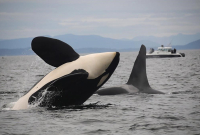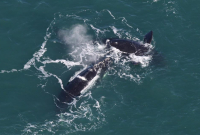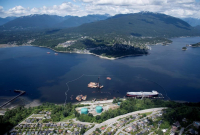Support strong Canadian climate journalism for 2025
Federal Environment Minister Catherine McKenna was confronted with the passions many people in British Columbia have for the plight of the West Coast's endangered killer whales while she cycled on a Victoria-area bike path Wednesday.
The minister said she was cycling to a news conference along Victoria's Galloping Goose Trail when she met a group of protesters calling on the government to do more to save the southern resident killer whales.
"Everyone knows the numbers here as I've seen and in B.C. (everybody) cares greatly about them," said McKenna in an interview. "It's challenging for sure. That's why we're making the investments through our Oceans Protections Plan, but also very specifically targeting the killer whales."
McKenna stopped for several minutes to speak with the protesters before getting back on her bike.
"We're absolutely committed," she said. "It's a challenging issue for sure."
The federal government introduced killer whale protection measures in the summer that included reducing noise levels from vessels, accelerating studies of the impacts of pollution on whale populations and restricting chinook salmon fishing, the preferred food of the southern residents.
Whale viewing distance limits were also increased to 200 metres to keep whale watch vessels and other boats away from the endangered whales.
It's estimated 74 southern residents remain on the West Coast.
The deaths of two southern resident killer whales this year focused worldwide attention on the orcas.
A female killer whale whose calf died shortly after birth pushed the body of the dead calf with her for more than two weeks. An intervention effort by both Canadian and American officials to save a second juvenile-aged female failed when the emaciated animal disappeared and was declared dead by experts.
"We're taking the measures we need to take, making the investments we need to do." McKenna said.
Last August, the Federal Court of Appeal overturned the federal government's approval of the Trans Mountain pipeline expansion project, sending the government back to the review phase to examine the impacts of tanker traffic and to consult more deeply with First Nations.
The court said the federal approval excluded the project's impact on the marine environment, which meant the National Energy Board energy board did not assess the potential impact of increased tanker traffic on the endangered southern resident killer whale population.
"We have said we need to do a much better job on the consultations," McKenna said. "Also the National Energy Board has to look at impacts on southern resident killer whales. We think on the southern resident killer whales we have taken a lot of measures that were not examined through the Oceans Protection Plan, and the new measures we've announced."
The federal government bought the Trans Mountain pipeline last May for $4.5 billion.





Comments